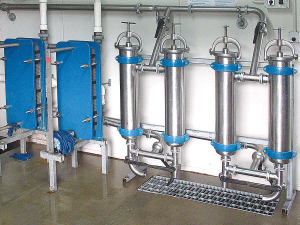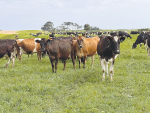Refrigeration is a key element in ensuring milk is cooled and stored at the correct temperature and there are a range a range of products and solutions for dairy farms of varying sizes.
Here are some solutions and their advantages:
Ice Banks
Ice Bank solutions are ideal for herds of up to 600 cows but can also be sized for larger numbers.
The unit manufactures ice between milkings with little or no impact on electricity supply. A small footprint means the Ice Bank can easily be accommodated in existing dairy parlours.
Milk enters the milk vat at the industry standard, generally around 6°C (42.8°F).
Advantages are:
- Small footprint easily installed on the majority of farms
- Ice made between milkings avoiding any impact on power supply
- Minimum water requirement so ideal for farms with limited water supply
Water Chillers
Water chilling is suitable for all dairy farms. The size of the unit and volume of the water tank determines how long it takes to bring the water in the tank down to the recommended temperature (often around 6°C (42.8 °F) enabling milk to enter the milk vat at around 9°C (48.2°F).
The chiller on the milk vat then reduces and maintains the milk temperature to the industry standard, generally between 4°C and 6°C (39.2°F and 42.8°F).
Advantages:
- Suited to all size farms
- Operates between milkings so minimum or no impact on electricity supply
- Units can be fitted to existing storage tanks on farm
Snap Chilling
Glycol Snap Chilling is ideal for large, continuous 24/7 operations. The unit is powered by inverter technology enabling it to ramp up to match loading and delivering power savings of up to 40% over standard compressors. Glycol chilling can also be supplied with standard technology.
Advantages:
- Power savings of up to 40% over standard compressors
- Reliably and efficiently chills milk to 6°C (42.8 °F) before it enters the milk vat
- Low milk entry temperature
- Sizes to suit all farms
Vat Chilling
Milk vat chilling is a cost effective option for farms whose milk is collected every other day.
It chills milk once it is in the milk vat and can be easily retrofitted into existing dairy parlours between milkings.
Advantages:
- Inverter compressors and electronic valves ensure precise load matching and maximum energy efficiency
- Ideal for upgrades to existing units on the farm milk vat
- Enables efficient chilling of milk in the vat meeting industry standard cooling regulations


















